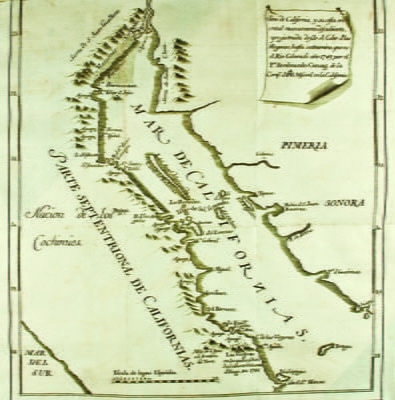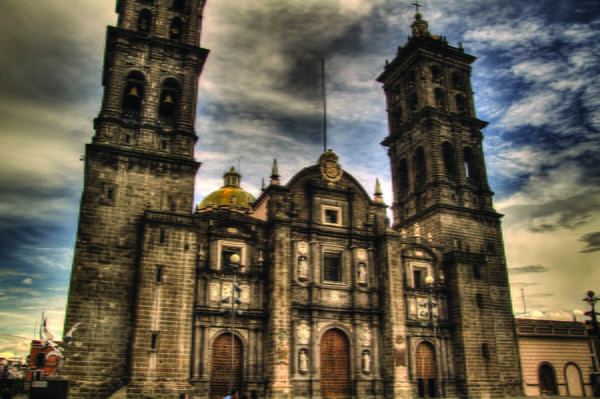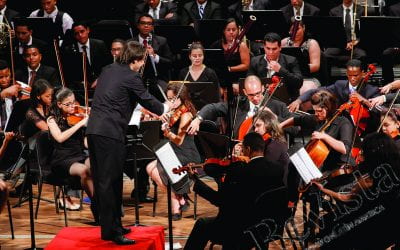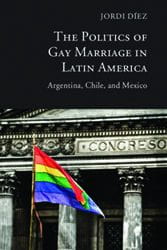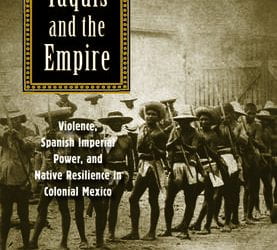El Camino Project
Forging Classical Links on an Ancient Road
With the latest election campaign uproar about Mexican immigrants, the U.S. mainstream media may be paying attention to their political clout, but generally not to the contributions of Latinos to the civic culture of the Americas.
When the U.S. media does pay attention to Latin American or Latino cultural life, they most often overlook the genre of classical music. Indeed, in the United States, audience attendance at classical music concerts is at an all-time low. Yet the opposite is true in Asia, Europe and Latin America.
Which makes what happens when Americans hear—really hear — classical music, especially that of Latin America, all the more miraculous. We believe, in fact, we know that the traditional and classical music of Latin America can help American communities avoid the pernicious impact of negative stereotypes. And we have launched a new initiative this year at Harvard and in California with a mission to prove exactly that.
El Camino Project merges our experience as performers, educators, producers, and advocates with our combined experience of what it means to be Mexicans, Latinos and Americans. We are taking that combination on the road—literally and figuratively—to rebuild a new awareness of Latino culture for a broad audience. The road of our choosing is El Camino Real—the ancient highway linking two continents and hundreds of cultures. It will serve as the central artery of our efforts, providing history, ideas and music—the lifeblood of culture—to map and guide our efforts.
The path of our collaboration disregards current notions of presenting traditional music in the usual way (in a large hall, with a large orchestra, on a large stage, in front of a tiny audience) in favor of the troubador’s approach—taking the stories and music of our heritage on the road with intimate salons or community gatherings. Our “artesanía de acción” combines elements of surprise, production and entertainment value with thoughtful curation of the Latin American classical and heritage genres and a soupçon of wit and old-fashioned parlor gossip. This paradigm is closer to forum theatre than to traditional concert presentation. The result?
The result is what we call the “I Had No Idea” effect upon an audience and community. “I see people’s faces change during performances,” says Dirlikov. “First one, then a couple more, then it’s like the whole room suddenly lights up.”
“They’re all thinking, ‘I had no idea,’” Davison Avilés adds. “I had no idea that Latin America had composers of classical music. Or, I had no idea Latinos performed classical music. Or, I had no idea the music is so beautiful, ethereal, transformative—all adjectives we have heard after one of our salons.”
“Actually in the United States there was one person who had an idea,” says another of our collaborators, Marisa Canales, founder and principal of Urtext, Mexico’s leading classical music label. “Leonard Bernstein.”
In his time, Bernstein innovated the popularization of classical music with lively presentations for young people, and filmed lectures that were equally entertaining and educational. He also knew and loved the music and people of Latin America—his wife, Felicia Montealegre, was born in Costa Rica and grew up in Chile. Through her, and his travels in Mexico and South America, he achieved a deep understanding of the power of its culture.
The idea for El Camino Project arose not with Leonard Bernstein—although it might very well have done—but with a policy conference a little more than a year ago. The White House Initiative on Education Excellence for Hispanics joined forces with the Mexican Heritage Corporation, Pixar Animation Studios, arts educators, curators and acclaimed international performing artists to discuss creating access to music education for Latino youth.
The two of us met at this conference (Dirlikov is an opera singer and Davison Avilés is a San Francisco-based impresario and arts advocate). Of Bulgarian and Mexican heritage, Dirlikov became an agent for change, forging an international brand through constant re-invention of her own trajectory as a professional singer. In the process, she has given new meaning to the term “emerging artist,” performing gigs in China, South America, Mexico, and Europe to make up for the fact that in America a career in opera is, in her words, “a challenge.”
“But really, there has never been such a thing as a traditional path to becoming an artist. And, what’s more, I have always believed that artists can be more than just interpreters—we can be educators and advocates, and researchers. I was especially interested in researching culture as I believe that art is born out of culture. I felt that being an artist allowed me a unique perspective to research culture, particularly while singing abroad,” notes Dirlikov.
If Dirlikov is the artistic change agent within El Camino, Davison Avilés is its finance and strategy guru. A Harvard College alumna ’80 with a degree in Fine Arts and a law degree from Stanford, she has combined her knowledge of the law, business and the arts to forge a career in which the tag might be, “production meets advocacy.” “I’m a producer—my job is to raise funds, build capacity, get the show up and do it in a way that creates and amplifies relevance and meaning for an international audience.”
Energized by the conference and policy discussions and by the urgent need to strengthen the financial, artistic and community development capacity for Latino classical and heritage music, we decided to join forces with colleagues Marisa Canales and Benjamin Juárez Echenique on a new strategy to change attitudes in the U.S. performing arts community, which neither understands nor appreciates the true impact of Latino classical and heritage music.
Canales and her husband, Juárez Echenique, have built an international reputation in the world of classical music. Together their footprint spans the worlds of recording, performance, research and academia. Canales is the founder and principal of Urtext Digital Classics, a producer of digital content in the classical music genre and an international concert flutist. Juárez Echenique, the group’s strategic adviser, is a conductor and currently a member of the music faculty at Boston University; he was formerly head of the Music Department at the National Autonomous University of Mexico, and Musical Director of Mexico City’s Grand Festival.
El Camino Project is not only following ancient roads; it’s carving out innovative paths. Canales will be developing new digital content for El Camino Project. A good example is the new software application Canales developed through her record label. This app, called En Concierto, brings the audience directly into the heart of an orchestra by creating an experience in which the user can choose to hear the music as the proverbial “fly on the wall” or actually immerse herself in the work of the conductor, soloists or members of the orchestra. This is accomplished through a scrolling score which is synchronized with the audio of the piece and four video screens showing each one of the players, as well as the conductor.
The first version of En Concierto, which presents the music of Mexican composer Samuel Zyman, performed by the Orchesta de Las Américas, is available for android devices through the Google store and was scheduled to be available for Apple devices by mid-October. El Camino Project amplifies the outreach and promotion of this digital content to build audience for the music and composer, and encourage investment in its distribution and development of new versions.
At Harvard, El Camino Project has also partnered with the Franklin Delano Roosevelt Foundation at Adams House, the David Rockefeller Center for Latin American Studies and the Cultural Agents Initiative at the Latin American Studies Department to voice the impact of Latino culture at a three-day international conference “Beyond Tomorrow: Safeguarding Civilization Through Turbulent Times” in October 2015.
Whether along an ancient road, in the halls of Harvard or through digital media, classical music is a way of empowering Latino voices. Music is perhaps the preeminent human practice for preserving past cultures. Through music we keep the past vividly alive and experience as closely as possible the feelings of our ancestors. By delving into the creative process, our project provides the community with a deep engagement with heritage art forms in danger of destruction, financial collapse or worse—of being forgotten amidst the noise and clamor of contemporary society.
Winter 2016, Volume XV, Number 2
Marcela Davison Avilés, Harvard College ’80, is Managing Director and Executive Producer of El Camino Project.
Carla Dirlikov is an opera singer and founder of El Camino Project. www.caminoarts.org
Related Articles
When Music Changes Lives
English + Español
n 2004, I got a surprising phone call from Santo Domingo on one cold winter night. I was then studying musical composition in Strasbourg, France, a great opportunity for a young Dominican…
The Politics of Gay Marriage in Latin America
Despite its recent successes, the gay rights movement in Latin America is generally ignored in discussions of contemporary Latin American politics. Even students of Latin American social…
The Yaquis and the Empire
Winner of the 2015 Latin American Studies Association Social Science Book Award and runner-up for the 2015 David J. Weber-Clements Prize of the Western History Association, The Yaquis…

